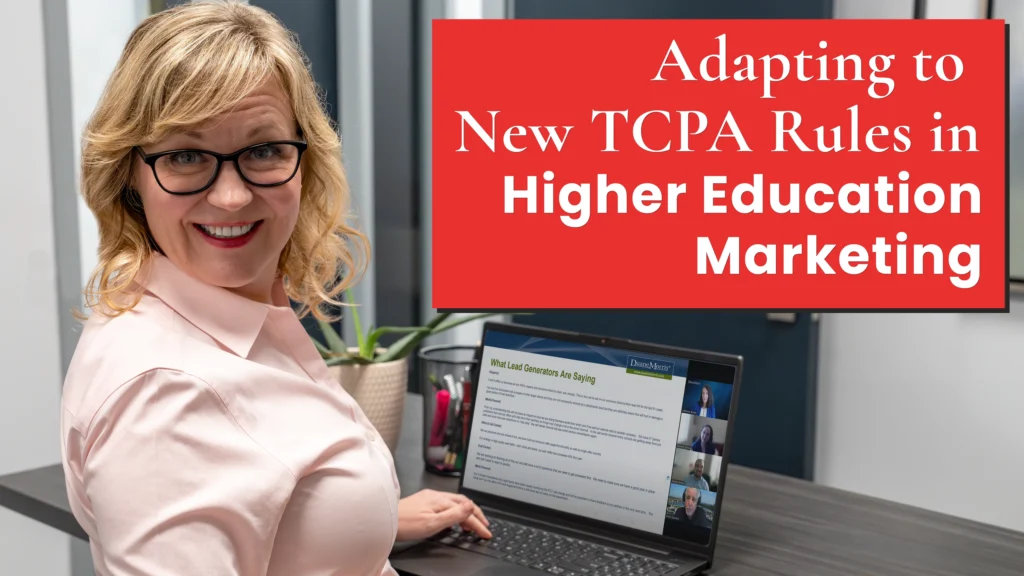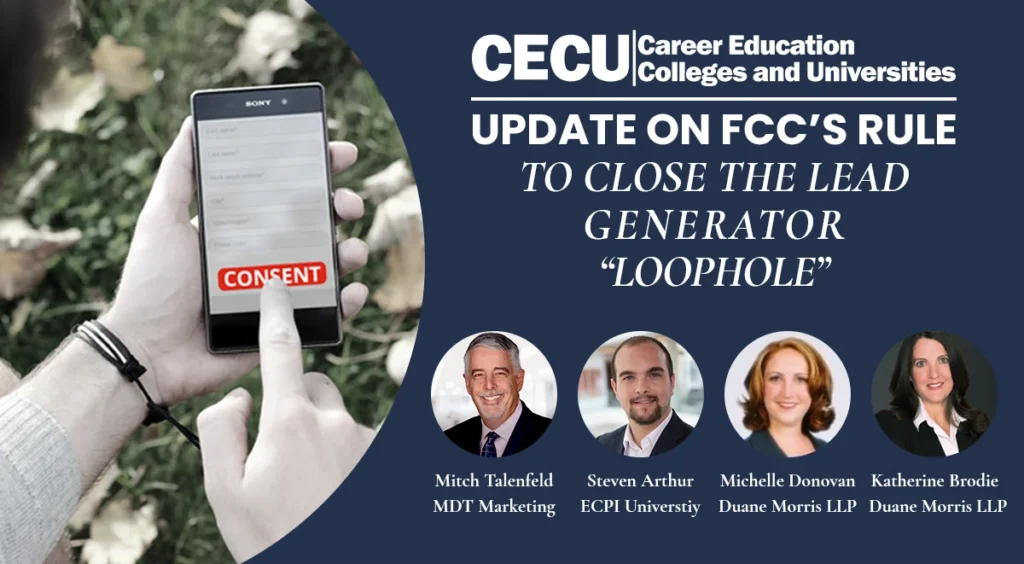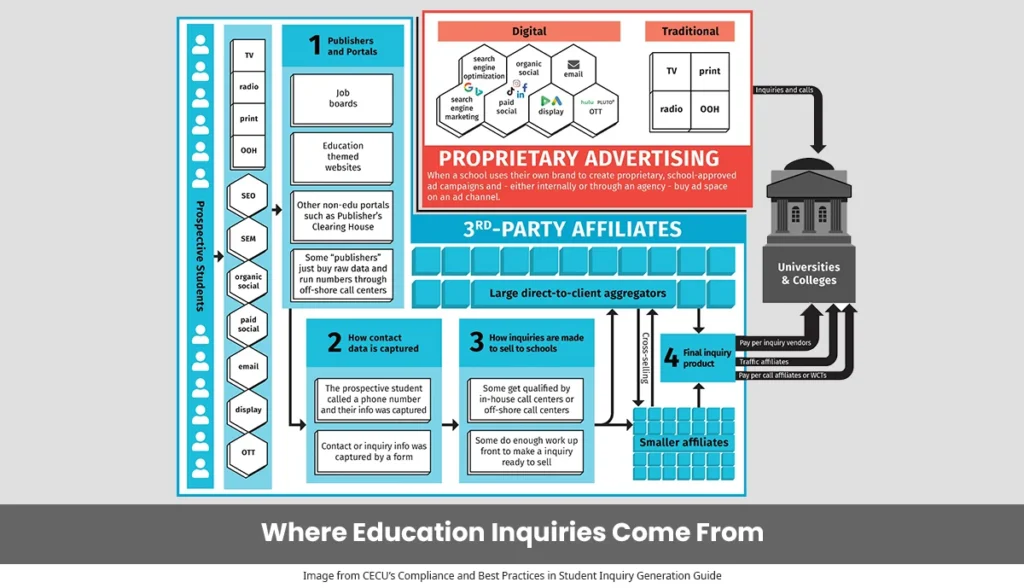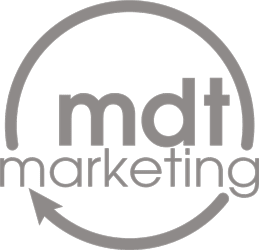
Ever feel like just when you’ve got everything figured out, the rules change? Well, you’re not alone. And that’s why on May 16, 2024, Career Education Colleges & Universities (CECU) hosted a webinar titled “Update on FCC’s Rule to Close the Lead Generator ‘Loophole'”.

The session featured industry experts Mitch Talenfeld, President and CEO of MDT Marketing; Stephen Arthur, Director of Data Analytics at ECPI University; Michelle Hon Donovan, and Katherine Brodie, Partners at Duane Morris LLP. They shared their insights on the new regulations and what they mean for your institution.
Here’s the lowdown on what’s changing and how you can stay ahead in the marketing game.
Understanding Lead Generators
Before diving into the details, it’s important to take note of the definition shared on the webinar. They defined a lead generator as any company that collects contact information in connection with an inquiry for a particular good or service. It was also mentioned that lead generating vendors are not only in higher education, but you’ll also find them in industries like insurance and finance. For further information on defining lead generators, reference the Compliance and Best Practices in Student Inquiry Generation: A Guide for Schools published by CECU.
Note: A task force is being formed to update this document to reflect the most recent changes. If you are interested in joining that task force, reach out to Mitch Talenfeld or Katherine Brodie.

Types of Lead Generators
Website-Based: Website-based lead vendors gather leads through online forms on non-exclusive websites, often referred to as comparison sites. These sites list a broad array of options.
- Example: Currently a site might advertise information on a nursing program and include a consent form stating, “If you’re interested, we have several partners who can send you information.” However, to meet the requirement of specificity, they often include a hyperlink labeled “our educational partners.” Clicking this link opens a list of all the different entities to whom the consent will apply. And suddenly the inquiry receives calls from 5, 10, or even 15 different companies.
Call Center Model: In the call center model, they operate through phone calls. Many lead vendors use this model to convert job searchers into education seekers. Ultimately, job sites and education providers are both aiming to help people improve their lives.
- Example: Someone visits a job site, enters their information for a job application, and gives the job site permission to call them to help find a job. During the call, the job site might suggest, “If you’re having trouble finding a job, maybe you need to get a degree. Would you consider going back to school?”. And thus converting the job board lead into an educational lead.
Mixed Model: Some vendors use a mixed model, combining website-based lead generation with follow-up phone calls. They gather leads online and then call the individuals to see if they are interested in other educational opportunities.
The Lead Generator “Loophole”
When the FCC talks about closing the lead generator loophole, they’re addressing a common practice where a lead generator uses a single consent to apply to multiple businesses. The FCC’s new rules require one-to-one consent, meaning consumers must give explicit permission to each individual entity, ensuring they fully understand who will contact them. This change is designed to ensure that consumers are fully aware of who they are consenting to be contacted by, eliminating the flood of unsolicited calls. Next let’s explore what the new consent requires, the change in verbiage, and the other key notes that were highlighted in the discussion.
Key Changes in the FCC’s New TCPA Rules
If you’re navigating the maze of compliance, these updates are essential. These new Telephone Consumer Protection Act (TCPA) regulation updates bring several significant changes to how lead generators must operate. As a result, your institution must also adapt to ensure compliance, given that you are liable for the actions of your third-party vendors. But don’t forget, these changes are designed to enhance your potential student’s protection and ensure that consent for communications is clear and specific.
New Rule Requirements
One-to-One Consent: Consent must be specific to one seller and logically related to the interaction that prompted the consent. According to what was shared on the webinar; this means you can’t just have a blanket consent for multiple businesses anymore.
Clearly vs Clearly AND Conspicuously: The redefinition of the one-to-one consent now requires consent to be given “clearly and conspicuously.” This legal distinction means that the consent must not only be clear but also prominent and easily noticeable. Duane Morris partner Michelle Donovan mentions that the courts have interpreted this to imply a higher burden of proof. This helps ensure that consumers are fully aware of what they are consenting to.
Additional TCPA Rule Reminders & Considerations
Text Messaging: Just a quick heads-up—text messaging is considered a call under the TCPA. So all the rules that apply to calls also apply to texts. This isn’t a new regulation but serves as a useful reminder.
Checked Boxes Are Not Consent: Pre-checked boxes on forms do not qualify as valid consent. Consumers must actively check the boxes themselves to indicate their consent.
Do-Not-Call (DNC) Policy Suggestion: While not a new regulation, having a written DNC policy is a recommended best practice. Another great call out made by Duane Morris partner Michelle Donovan is to make sure all your staff know where to find it. Additionally, it can be a big red flag when the DNC policy is asked for. Be sure the staff are trained on its importance and where to find it. This is a crucial step to ensure compliance and avoid potential legal issues.
And of course, it’s always a good idea to review your current processes and ensure everything is up to par.
Impact on Higher Education Institutions
So, what does all this mean for higher education institutions? Well, for starters,
- The Cost Per Lead (CPL) is Expected To Rise
- Smaller Institutions Out Bid by Large Competitors for Paid Leads
- Lead Generator Consolidation
- Lower Lead Rejection Rates
- Fewer Leads
With the expectation of a rising CPL due to the increased compliance, smaller institutions might struggle. They would have to compete with larger colleges and universities for paid leads, as the budget needed to maintain lead volume increases. It’s like trying to keep up with the Joneses in the marketing world—bigger budgets usually win.
The changes might also lead to lead generator consolidation. With fewer, more compliant lead generating vendors in the market, institutions may face higher competition and costs. And again Smaller schools could find themselves further squeezing their lead acquisition efforts.
Additionally, the focus on clearer consent guidelines is likely to result in lower lead rejection rates. However, this also means fewer leads overall, as each lead must explicitly consent to be contacted by each individual institution. This shift could make it even more challenging for schools to reach their enrollment goals when relying heavily on PPL vendors.
Though that all sounds doom and gloomy, Steven Arthur from ECPI University is optimistic that the industry will adjust and level out as more lead providers enter the industry in about a year or two. Time will tell. In the meantime, there are some marketing strategies to take now to make sure your lead volume isn’t drastically affected.
Preparing for a Drop in PPL Channels
As Steven Arthur mentioned during the webinar, “Don’t wait to start reviewing, exploring, and improving your process with one-to-one consent.” It’s crucial to ensure that all your marketing channels are compliant with the new TCPA rules. Implementing sophisticated lead scoring and verification methods will help preserve lead quality and keep your institution competitive.
Suggestions for Adapting to the New Landscape
Leverage Third-Party TCPA Compliance Tools
- Use services like Jornaya and Trusted Form to track and verify consent, ensuring all interactions are compliant. Think of them as your trusty sidekicks in the fight against non-compliance.
Enhance SEO and Content Marketing Efforts
- Focus on organic search to reduce reliance on paid leads. Create valuable content that attracts and engages potential students. For further details on SEO for higher education, read Strategic SEO: A Catalyst for Effective Awareness Nurturing.
Utilize Paid Search and Social Media Marketing
- Explore platforms like Google, Bing, Facebook, TikTok, and more to reach a broader audience and diversify lead sources. Check out this article Choosing the Right Marketing Channels Outside Google for additional information on other pay per click (PPC) channels.
Develop Referral and Re-entry Programs
- Create programs that engage current students and your alumni and encourage them to refer new students.
- Implement re-entry initiatives targeting past inquiries. It’s all about keeping the conversation going but check with compliance on how best to re-engage.
Implement Retargeting Ads
- Use retargeting to reach prospective students who have previously shown interest but did not convert. Going to college or going back to school can be a huge decision. Stay in front of them so when they are ready, your institution is still top of mind.
By taking these steps, higher education institutions can not only adapt to the new FCC rules but preserve lead quality and continue to thrive in a competitive landscape.
Moving Forward with Confidence
Adapting to the new FCC TCPA rules can seem daunting, but with the right strategies, higher education institutions can continue to thrive. By diversifying marketing channels, leveraging technology for compliance, and enhancing content marketing efforts, schools can mitigate the impact of rising costs and decreased lead volume in PPL channels.
If you have any questions on the best marketing channels to review, explore, and optimize, schedule a strategy session with MDT Marketing. We’re here to help you navigate these changes and ensure your institution’s continued success.
Ready to optimize your marketing channels? Schedule a strategy session with MDT Marketing today!
Additional Resources:
- Additional Marketing Guidance:
